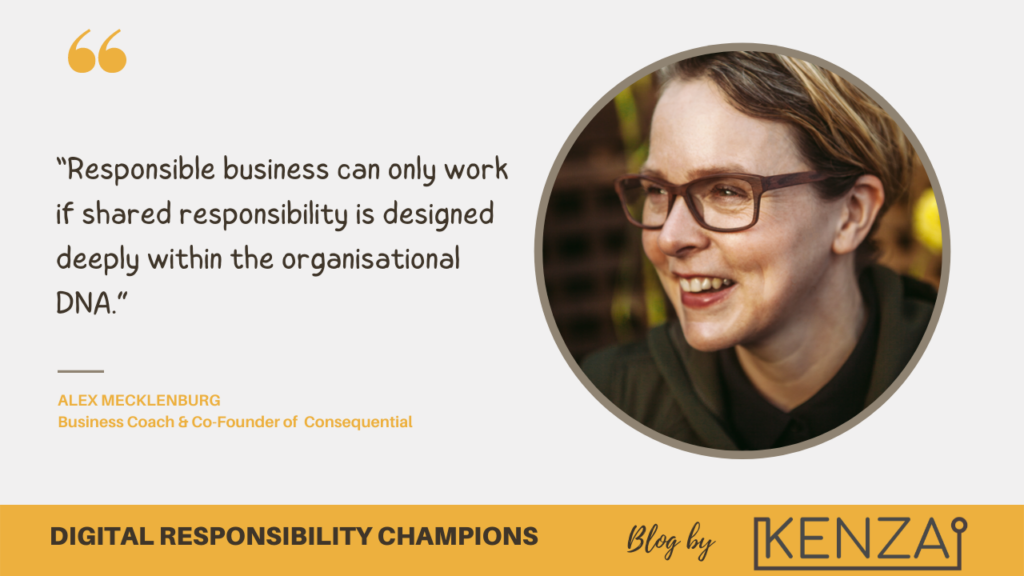Champion Nr. 3: Alex Mecklenburg
For this article I talked with Alex Mecklenburg, a business coach, organizational change strategist and Co-Founder of Consequential. Consequential is a social innovation practice specializing in strategy, culture and change that enable people to build their businesses and products in responsible and resilient ways. Alex’s goal is to support creators, leaders and teams who want to be responsible with their power and also make a difference in their communities. With her I discussed how to put ethical thinking, ethical values and strategies into practice. She shared with us very practical tips that I hope will help you get started in applying ethics to your daily work.
In the last two articles we talked about the basics of ethics and of corporate responsibility. Once an organization has decided to adopt higher ethical standards on how they do business, a long journey of cultural change starts. And that is typically the moment when Alex and Sam come in to help the organization explore how to build their very own responsible practices that will sit at the heart of the business and shape decision making and product development.
How do you help organizations make this cultural change happen?
My Co-founder, Sam, and I create methodologies to help organizations put their strategy and governance principles into practice and we support them on the journey with both facilitating and coaching where needed.
As Consequential we understand responsibility needs to be designed deeply within the DNA of an organisation. In order for organisations to create shared understanding and responsibility that lives in the everyday of their business, they need to ask themselves:
What are our principles – fundamental agreements on how a system (e.g. your business) behaves-so that we deliver against our strategy? What are the practices that we need to create to allow people to behave according to those principles and build the culture we intend? And where do we need policies that provide clarity, direction and most importantly accountability?
Let us take an example of a family practice: Sunday lunch. It is a practice that supports the principle of ‘celebrating togetherness’. Throughout the week, everything else can be fluid in family life and everybody is continuously somewhere else. By introducing the practice of Sunday lunch, families can actually put the principle of ‘celebrating togetherness’ into action. Without creating practises like that, togetherness as a value or belief will simply remain a wishful concept, a dream. Something that everybody agrees on ‘in principle’ but not ‘in practice’.
“3Ps – principles, policies, and practices – is a framework that will help you govern your business according to your values”
The same applies to businesses. This is why we focus on the 3Ps – principles, policies, and practices – as a framework that helps you govern your business according to your values. For organizations to move from discussing ethical values, ethical strategy and responsibility to enabling responsible business actions, they need to design principles, practices and supporting policies – visible to everybody within the organisation -which bring those values to life.
Picture: courtesy from consequential
If one of your core values is that AI should be trustworthy, then you need to look at:
– Which principles will help you codify how you work with each other in order to deliver against this core value and your strategic business intent?
– How do these principles shape the way you build your products and services?
– How do these principles influence or shape all of your business practises and your culture?
As you can see, these questions apply to not only the way you build your technology but also to how you run your business. They cover not only technology practises like data collection, but also business practises and policies like drafting contracts, or accepting funding.
Does the size of an organisation make a difference in how to go from principles to practice?
Absolutely. Having said that, I think it is less dependent on the size of the company, but more on collective focus and rigour of the process. Putting an ethical or responsible strategy into practice has to be embedded into an organisation’s very own change process; how you close the gap between the large strategic decisions and the day-to-day business.
“Putting an ethical or responsible strategy into practice has to be embedded into an organisation’s very own change process”
An example:
For the principle “We fail forward” to be successfully embedded into the day-to-day business, it is important to ensure that everybody within the organisation has the same understanding of how that will help the organization deliver against its strategy and how it will impact day to day behaviour.
For that you need to ask:
- What intended impact do you want to see when you follow this principle in your day-to- day work?
- What practices do you, as a team, need to either shape, implement or change to be able to act on that principle?
When the organization we worked with came up with this example, we asked their teams what they would need to successfully apply the principle of ‘failing forward’. In the process it became clear that the teams would need space, time and permission for reflection and learning. But the team didn’t have a single practice that supported learning. Without a practice, they were struggling to understand how the principle could create positive change in the way they worked with each other. Believing in the concept of ‘failing forward’ was not enough, they needed to create practices to make it work. The organisation decided to introduce retros and that helped them learn, and every team was able to design on their own how those retros would work for them depending on their workflow and objectives.
As humans, we tend to be in love with our concepts and we are wrangling with our reality
As humans, we tend to be in love with our concepts and we are wrangling with our reality. That is pretty normal behaviour. As a coach you learn very early on that calling things out and normalising them is the first and most important ingredient needed to create the openness for people to understand how they currently behave and realise where change is needed.
The second most important ingredient is the ability to create a safe space that allows everybody in the process to be daring. In this case daring enough to question current principles and behaviours, imagine new ones and potentially re-imagine the way the business operates. Once you have translated your principles into practices it is time for the last question:
- Where do you need policies: guidelines that provide clarity and direction for everybody in the business on how to operate, and accountability for ensuring they act accordingly?
This change process does not need to be a linear one – starting with principles and ending with policies. Your organisation will already have so much wisdom within it – it is mainly about allowing you to ‘harvest’ what already exists, make it visible for everybody and connect it to your organisational intent. You have to ask yourself at the beginning of your change journey: what do you want to see happen as a result of the principles, practises and policies you introduce and how will they help you deliver your ethical or responsible strategy?
Have you come across principles that did not make it into practices?
Yes. When you explore how to translate principles into practices you will have a lot of honest conversations. One of the core questions that we always ask leaders and teams is:
- Do these principles really apply to everybody?
Take the example of the principle “Don’t ask for permission, ask for forgiveness”. I call bullshit on that principle. The principle implies that everybody gets forgiven, but in all of my time working with organisations I have never been in a business that would apply this principle to everybody. Which makes it a deeply privileged principle. As long as there are people, who won’t be forgiven, then the principle won’t work.
And if you were to want to make it work then you would need to ask yourselves:
- What would our existing practises look like if people can ask for forgiveness instead of permission?
- Does this principle apply across all of our existing business practises?
- What new practices do we need to establish so people can ask for forgiveness instead of permission? Do we need any policies to ensure clarity of engagement?
- How can we make sure that these practises are designed for everyone?
What is your summary?
Responsible business can only work if shared responsibility is designed deeply within the organisational DNA. The key question is how do we create shared responsibility?
“Responsible business can only work if shared responsibility is designed deeply within the organisational DNA”
Shared responsibility demands shared clarity for everybody within the organization on what the organisation does, why it does what it does and what drives business decisions.
Once you have that clarity, you need to create a shared understanding within your business of what your ethical responsibility looks like in action.
The moment that you have established and embedded shared principles and shared practises within your organisation supported by useful policies, your business will move from having passionate discussions about ethical beliefs and principles in pockets of the organisation to embedding and iterating ethical practices in the work together, as one organisation.
And that can be a game changer.


